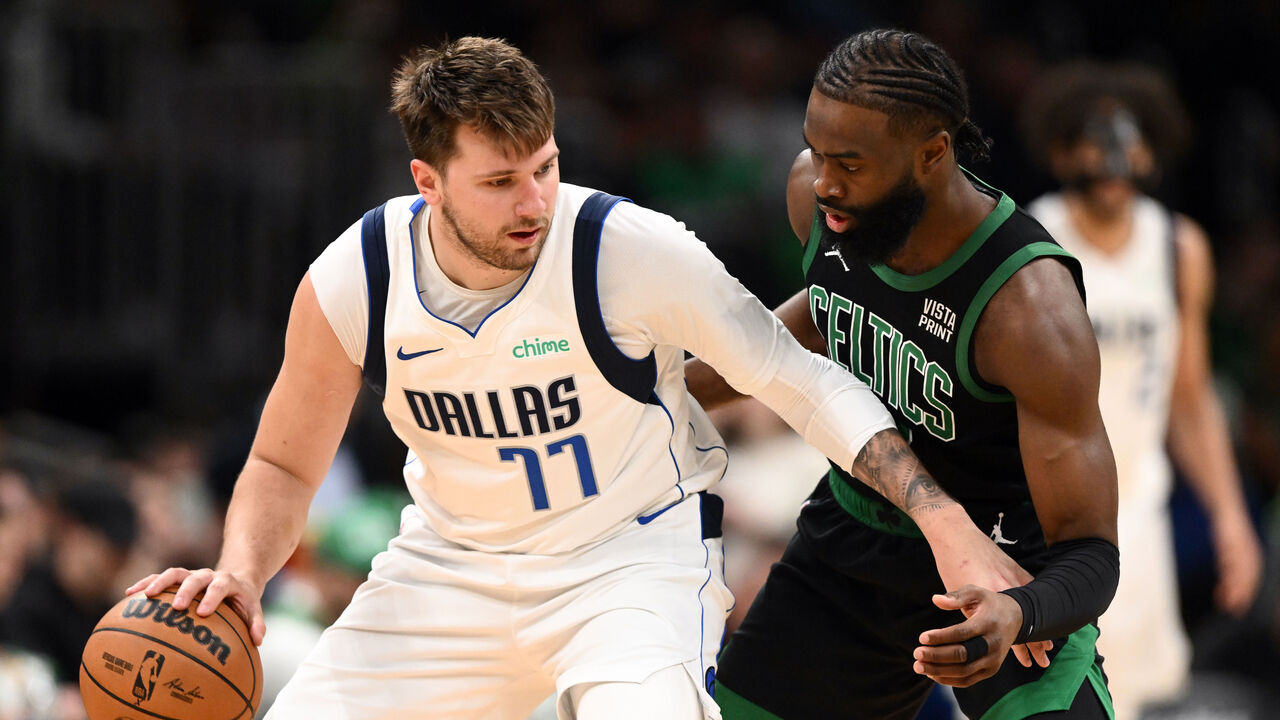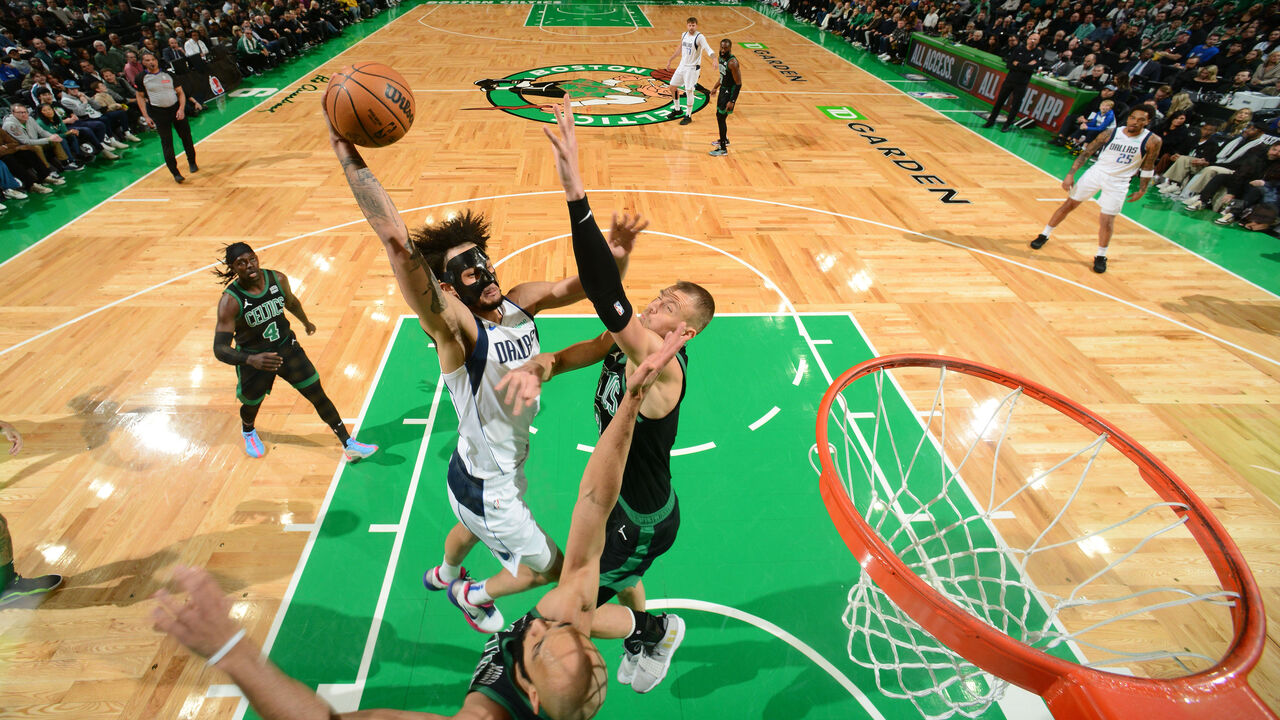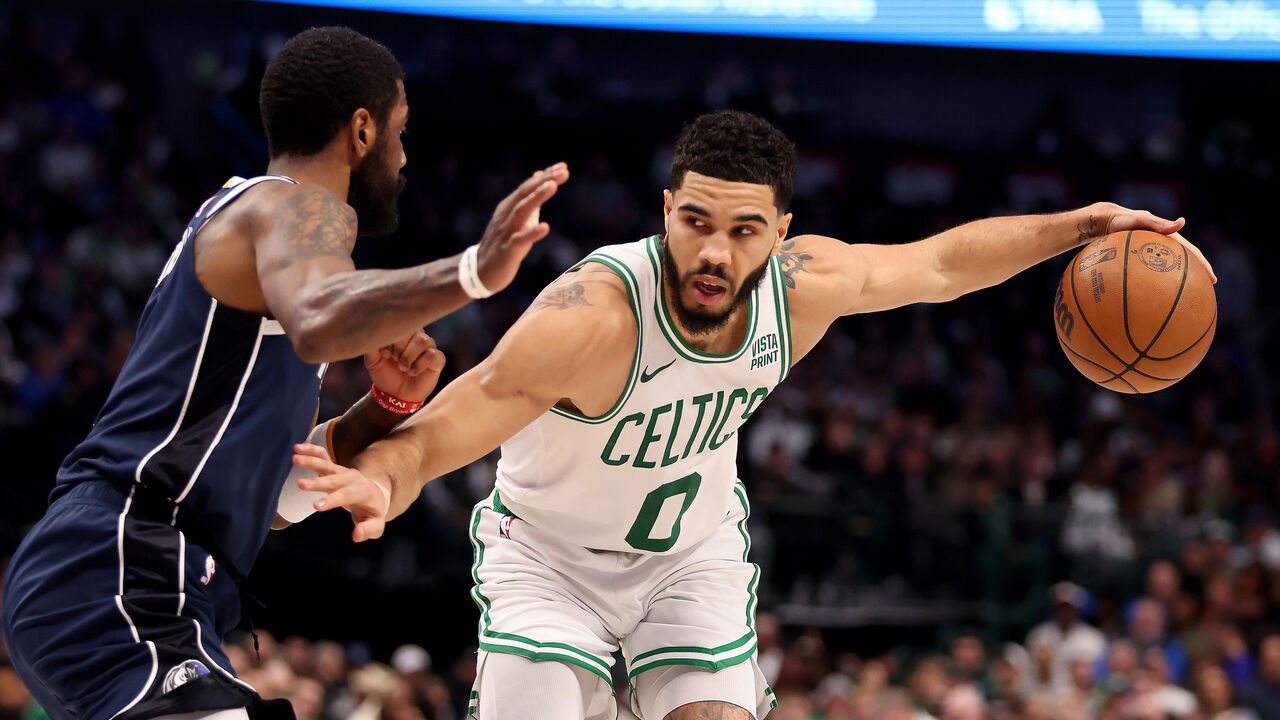The 3 battlegrounds that will decide the NBA Finals
After a week-long hiatus following a short conference finals round, the NBA Finals will finally tip off Thursday night. In one corner, we have a 64-win Boston Celtics team that's been knocking on the door for a half-decade and has been historically dominant all year following two crucial offseason trades. In the other corner, we have a surging Dallas Mavericks squad that remade itself at the trade deadline and has been flattening everything in its path ever since, led by one of the greatest young players we've ever seen.
Here are the key three tactical battlegrounds that will help determine who wins the series.
Boston's matchup toggling and Dallas' response

The defining characteristic of the Celtics' defense is interchangeability. Outside of center Kristaps Porzingis (who's expected to return from a calf strain for Game 1) and his backup/replacement Al Horford, every Boston starter can guard between three and five positions, depending on the matchup. That allows the team to juggle assignments and cross-match as it sees fit, with Porzingis spending far more time roaming off low-usage wings than guarding opposing centers.
The upshot of that defensive tactic and the Celtics' positional flexibility is that they can comfortably switch opponents' primary pick-and-roll actions while keeping Porzingis out of those actions and as close to the basket as possible, as often as possible. And that's going to be a huge part of their strategy to slow down Luka Doncic, Kyrie Irving, and the Mavericks' high-powered offense.
Boston will likely use Jaylen Brown as its primary Doncic defender, since he has the best combination of height, heft, and agility for the job. Where things get really interesting is with the other four Celtics defenders on the floor. The bet here is that Porzingis starts out on Derrick Jones Jr., while Jayson Tatum matches up against whichever of Daniel Gafford or Dereck Lively II is in the game at the five. That would make every Doncic-center pick-and-roll an automatic switch, with Dallas gaining minimal advantage on the front end or the back.
Jrue Holiday and Derrick White represent the closest thing to antidotes for Irving, but Boston also has to think about how it wants to handle Doncic-Irving screening actions. If the C's want to switch those as well, then Holiday makes more sense as Irving's primary because his superior size and strength give him a better shot at handling the Doncic matchup. That would leave White on P.J. Washington, making it easier to keep him out of the Doncic switch (putting two on the ball is a lot less dangerous when Washington is screening and popping rather than Irving) while also making better use of White's elite low-man help capabilities.
Whether or not the Celtics actually match up that way out of the gate, their defensive alignment will be fluid. They'll throw different looks at Doncic and Irving, and everyone will get a crack at guarding those two, be it on switches, transition cross-matches, or reshuffled primary assignments. Holiday's been jostling with centers all season; he'll probably see some time on Lively or Gafford.
It's hard to make a defense that has so many options feel uncomfortable, but if any team can do so, it's these Mavericks. Doncic will find the tiniest vulnerabilities in Boston's armor and poke and prod until they bleed. The name of the game for the Celtics is to avoid putting two on the ball and to stay out of rotation, but he will at least force them to reconsider. Dallas will find also ways to draw Porzingis into the action and away from the rim, like using Jones (or whichever wing Porzingis guards) as an empty-side ball-screener or an off-ball screener for Irving. Gafford and Lively won't be able to leverage their size mismatches in the post, but they might be able to do so on the offensive glass. We've seen Washington tap into some bully ball this postseason when defenses put smalls on him.
The Mavs' calling card throughout this playoff run has been adaptability. In the West semis, they overcame a swarming, strong-side-overloading Thunder defense thanks to some clutch 3-point shooting from role players like Jones and Washington. In the West finals, they saw a steady diet of drop coverage from a Timberwolves team that was more interested in staying home on shooters and limiting off-the-catch threes; their two stars cracked it open. Boston's defense presents an entirely different challenge. Its personnel is similar to OKC's, only bigger. Its philosophy is similar to Minnesota's, but with less matchup rigidity.
Whatever the outcome, it's going to be fascinating to watch Dallas try to adapt one more time to clear this towering final hurdle.
The push and pull at the rim

These are two potent offenses, but neither does a ton of damage from point-blank range. They finished 26th and 29th in rim frequency during the regular season and rank 13th and 14th among 16 playoff teams, according to Cleaning the Glass, with the only two teams below them being first-round outs.
At least part of that is by design. Both teams shoot a ton of threes, and both have the shooting talent - not just from beyond the arc, but from mid-range and floater range (at least in Dallas' case) - to be selective about the rim shots they take. Coupled with their ability to space the floor in their own ways (horizontally for the Celtics, vertically for the Mavs), those carefully curated interior shots become especially profitable. To wit: The Celtics are shooting a league-best 74.5% at the rim in the playoffs, while the Mavs are tied for third at 68% even after struggling mightily to finish in the second round against the Thunder.
But the lack of volume can leave both offenses susceptible to jump-shooting variance, and the teams' respective defenses won't make it any easier to get to the rim or finish there.
The Mavs morphed into one of the best interior defenses in the league after adding Gafford and Washington at the trade deadline, and that's been a huge component of their run to the Finals. With two excellent individual rim-protectors in Gafford and Lively, a ton of supplemental size on the wing, and a scheme designed to load up on drivers, they've held opponents to just 59.4% shooting inside the restricted area, third-lowest among playoff teams.
The Celtics have conceded a comparatively porous 70.6% from that range, but that's offset by the fact that they've allowed fewer rim attempts than any other team - a testament to their ability to flatten out opposing offenses and keep the ball in front with their seamless above-the-break switching. That number should also improve considerably with the 7-foot-3 Porzingis once again patrolling the back line.
At first blush, it feels like the Celtics should have an easier time sustaining their rim deterrence in this series, though that obviously depends on how effective Porzingis can be in his return. If he's operating at something close to his baseline, Boston will take away a lot of the rim-rolls and lob dunks Gafford and Lively subsist on. Porzingis can also pull those two away from the basket on the other end, and the Celtics don't have anyone like Jones in their regular rotation who the Mavs can comfortably stash their centers on. Holiday is the closest thing to a hiding spot that Boston offers, and he's hit 40% of his threes in the playoffs after cashing 43% during the regular season.
The Mavs' playoff opponents to this point have struggled to attack advantages on the second side when Dallas has loaded to the ball, due to not only a lack of shooting but a lack of secondary creation and attacking verve. Boston should have no such issues. Even though the only two lob threats in the series reside on the other team, the Celtics can win the rim battle if they make it a priority. Will they make it a priority?
The iso scoring contest

These teams can move the ball well against defenses in rotation, but they both rely on mismatches - and the mere threat of them - in order to get those defenses moving. Both teams rank in the top four in isolation frequency in the playoffs after ranking second and fourth during the regular season. And considering that both defenses force opponents into a lot of isolation possessions because of their proclivity for switching, how effectively each team handles those scenarios will play a big part in how this series shakes out.
On the surface, Dallas has the advantage on this battleground. Doncic and Irving are the two best isolation scorers in the series. (That's no knock on Boston; they're simply two of the five best iso scorers in the sport.) Though the teams produced almost identical per-possession averages on the play type this postseason (0.98 points for Dallas and 0.97 for Boston, per NBA Advanced Stats), the Mavs did it against much better defensive competition, especially in the last two rounds.
On the other hand, the Celtics can create more favorable individual matchups, which could functionally erase their self-creation deficit. Sure, Doncic will bump and chisel his way to buckets against whoever Boston throws at him, and Irving will use his ball-handling sorcery to shake free of whichever All-Defensive point-of-attack stopper he faces. But that's probably still more effortful than what Tatum or Brown will have to do - even with their smaller arsenals of one-on-one moves - to score on Irving or Doncic at the other end.
Dallas' two stars have gotten plenty of deserved credit for their commitment to the defensive end throughout this playoff run, but they're still plainly the worst defenders in either starting lineup. Boston might not even need to generate switches in order to exploit those two, provided Holiday and White attack with the same gusto they demonstrated against Tyrese Haliburton and the Pacers in the East finals. Dallas has also shown a greater willingness than Boston to switch its centers out onto the perimeter, Lively in particular. In those situations, the Celtics absolutely have to attack the basket.
Both benches feature exploitable defenders, but in terms of starters-on-starters, the Mavs serve up more mismatch-hunting options. The question is whether their lead creators are unstoppable enough (and Boston's lead creators willing enough to settle) to render that reality moot.
Joe Wolfond covers the NBA for theScore.